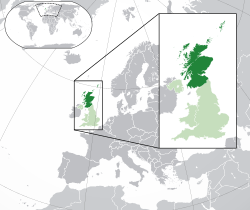This article may rely excessively on sources too closely associated with the subject , potentially preventing the article from being verifiable and neutral.(January 2026) |
 Scottish Law Commission logo | |
| Agency overview | |
|---|---|
| Formed | 1965 |
| Type | advisory non-departmental public body |
| Jurisdiction | Scotland |
| Headquarters | Parliament House, 11 Parliament Square. Edinburgh EH1 1RQ |
| Motto | "Promoting law reform" |
| Minister responsible | |
| Agency executives |
|
| Parent department | Justice Directorate of the Scottish Government |
| Key document | |
| Website | www |
| Map | |
 Scotland in the UK and Europe | |
| Part of a series on |
| Scots law |
|---|
 |
The Scottish Law Commission (Scottish Gaelic : Coimisean Lagh na h-Alba) is an advisory non-departmental public body of the Scottish Government. It was established in 1965 to keep Scots law under review and recommend necessary reforms to improve, simplify and update the country's legal system. It was established by the Law Commissions Act 1965 (as amended) at the same time as the Law Commission in England and Wales. [1]
Contents
Appointments are ordinarily made in accordance with the Commissioner for Public Appointments in Scotland's Code of Practice.
The commission is part of the Commonwealth Association of Law Reform Agencies.